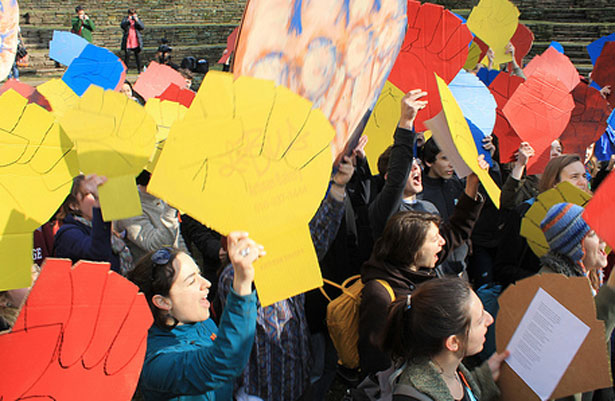 Students at the Power Up! Divest Fossil Fuels conference
Students at the Power Up! Divest Fossil Fuels conference
In the final hours of Power Up! Divest Fossil Fuels, it seemed like there was still too much to discuss, plan and do. As students gathered one last time, the movement's strategic groundwork was examined. How can the disparate divestment campaigns be united? How can information best be shared and disseminated between the thousands of students already involved, and the thousands more soon to get fired up? How can we get all this done before the Keystone XL pipeline is built, and more people die and our planet is irrecoverably made uninhabitable? Logistics aside, it was apparent that conference attendees were more than ready to return to their schools and get to work.
Dividing into breakout groups, ranging from topics like using arts for action to negotiation strategies to forming a clear-cut national strategy, it became clear that the students already have the skills, strength and sheer will to make real ripples in the larger climate justice movement. Organizations like 350.org, the Responsible Endowments Coalition and others renewed their promise to let the movement flourish autonomously as student-led and student-run, and offered resources and organizational infrastructure as tools that could be utilized. Discussions wound down—although follow-up e-mails are already furiously flying—and all the attendees marched into Swarthmore's outdoor amphitheater for a final rally.
Singing songs and chanting, the students raised (giant, colorful cardboard) fists to the sky, marching into the administrative building and planting the props on a giant cardboard tree, raising the sculpture to the ceiling for administrators to discover upon their arrival to work Monday—a dramatic message to the Swarthmore administration, which has time and time again refused to budge on the issue of divestment, despite protracted efforts by students and frontline community members over the past year.
As students left to return to their home institutions, so many questions remained in the air: how will this movement move forward? Will fossil fuel companies, let alone their "progressive" universities and colleges, listen to their demands? It remains to be seen. But as Bill McKibben points out, the use of divestment as a tactic to fight for climate justice is here to stay. For the first time in thirty years, students are rising up and taking action to make their voices hears. Students are rising up and taking action to make their voices heard on divestment. Everyone, from Shell and Exxon to Boards of Trustees to President Obama, should stop and take notice.


